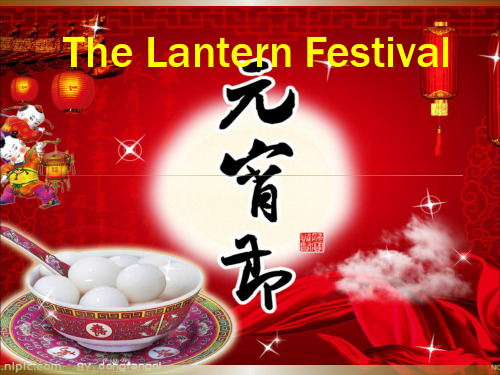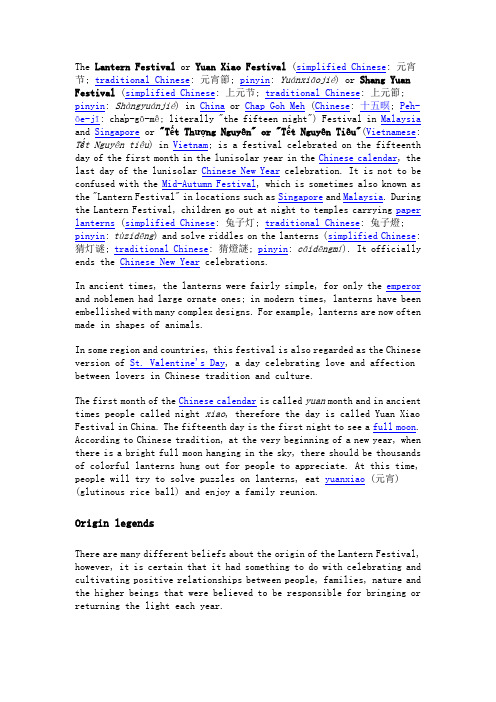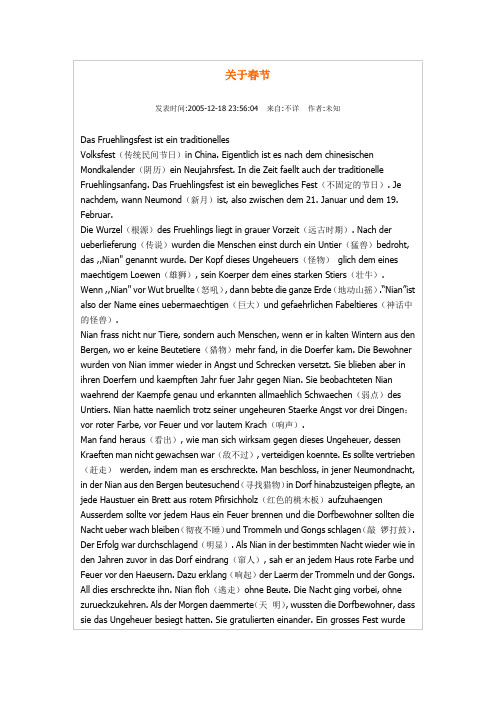元宵节德语
- 格式:doc
- 大小:30.04 KB
- 文档页数:7

德语口语常用句:节假日1.Das wichtigste Fest in Deutschland ist das Weihnachtsfest.德国最重要的节日是圣诞节。
2.Komm, gehen wir zum Weihnachtsmarkt ! Siehst du, wie schön die Weihnachtsbäume mit Kerzen und Lämpchen geschmückt sind ?走,我们到圣诞市场去!你看,那些圣诞树上装饰着蜡烛和小灯泡,多漂亮!3.Was hat dich an Weihnachten am meisten beeindruckt ?圣诞节给你留下的最深印象是什么?4.Warum fällt der Heiligabend ausgerechnet auf den 24. Dezember ?为什么圣诞夜偏偏落在十二月二十四号?5.Der Weihnachtsbaum und die Krippe darunter sind sehr typisch.圣诞树和树下的小马厩是很典型的。
6.Haben Sie die Krippe unter dem Baum selbst gebastelt, Frau Schön ? Wie niedlich ist sie !舍恩夫人,树下的小马厩是您自己做的吗?多可爱啊!7.Kannst du schon ein paar Weihnachtslieder, z.B. …Stille Nacht“ und …Oh Tannenbaum“ ?你已经会唱圣诞歌了吗,比如:“圣诞夜”和“圣诞树”?8.Ich finde, das Weihnachtsfest ist wie bei uns das Frühlingsfest ein Familienfest.我觉得,圣诞节就象我们的春节,是个家庭团聚的节日。


中国的传统节日冬至德语介绍Dongzhi-FestSchon in der Frühlings- und Herbstperiode (770-221 v. Chr.) beobachtete man in China mit chinesischem Gnomon die Sonne und stellte die Wintersonnenwende (im Chinesischen: Dongzhi) als einen der 24 Jahreseinteilungstage des Mondkalenders, der dem 22. oder 23. Dezember entspricht, fest. Nach der Wintersonnenwende wird der Tag immer l?nger. Die Vorfahren der Chinesen gingen davon aus, dass Yang danach zunehmen und ein neuer Zyklus beginnen würde. Deshalb feierten sie diesen Tag als ein Fest.Das Dongzhi-Fest hat seinen Ursprung in der Han-Dynastie (206 v. Chr.-220 n. Chr.) und erreichte in der Tang- und der Song-Dynastie (618-1279) seinen H?hepunkt. In der Han-Dynastie wurden an diesem Tag in den Beh?rden Gratulationszeremonien, die als "Gratulation zum Winter" bezeichnet wurden, veranstaltet. Deshalb hatten alle Beamten an diesem Tag frei, die Truppen blieben an Ort und Stelle, die Grenzen wurden geschlossen und die Gesch?fte legten den Betrieb still. Verwandte und Freunde verbrachten fr?hlich einen ruhigen Tag, indem sie Besuche austauschten und einander Delikatessen schenkten. In der Tang- und der Song-Dynastie opferte man an diesem Tag dem Himmel und den Ahnen. Der Kaiser ging in einen Vorort, um eine Opferzeremonie zu veranstalten. In Dokumenten der Qing-Dynastie (1644-1911) hei?t es sogar, dass das Dongzhi-Fest noch wichtiger als das Frühlingsfest sei. Das zeigt, dass unsere Vorfahren diesem Fest gro?e Aufmerksamkeit schenkten.In Nordchina isst man am Dongzhi-Fest an einigen Orten Huntun (klare Suppe mit Fleischt?schchen) und an anderen Orten Jiaozi. Man sagt, dass man k?ltebest?ndig sein würde, wenn man am Dongzhi-Fest Jiaozi esse. In einigen südchinesischen Gebieten hat man die Sitte, am Dongzhi-Fest Klebreis mit Rotbohnen zu essen, um Seuchen und Teufelzu vermeiden. In anderen südchinesischen Gebieten isst man an diesem Fest Tangyuan (im Wasser gekochte Klebreiskl??chen mit Füllung). Tangyuan, die am Dongzhi-Fest gemacht werden, hei?en auch Dongzhiyuan. Sie k?nnen sowohl als Opfer für Ahnen als auch als Geschenke für Verwandte und Freunde dienen. Auf Chinas Taiwan wird die Sitte heute noch beibehalten, dass man am Dongzhi-Fest mit neunschichtigen Kuchen aus Klebreis in Form von Hühnern, Enten, Schildkr?ten, Schweinen, Rindern und Schafen, die alle in China als Symbol des Glücks gelten, den Ahnen opfert. Leute aus demselben Clan versammeln sich am Dongzhi-Fest oder an einem Tag vor oder nach ihm im Ahnentempel, um ihren Ahnen zu opfern. Nach der Opferzeremonie veranstalten sie noch ein Bankett.。

The Lantern Festival or Yuan Xiao Festival (simplified Chinese: 元宵节; traditional Chinese: 元宵節; pinyin: Yuánxiāojié) or Shang Yuan Festival (simplified Chinese: 上元节; traditional Chinese: 上元節; pinyin: Shàngyuánjié) in China or Chap Goh Meh (Chinese: 十五暝; Pe h-ōe-jī: cha p-gō-mê; literally "the fifteen night") Festival in Malaysia and Singapore or "Tết Thượng Nguyên" or "Tết Nguyên Tiêu"(Vietnamese: Tết Nguyên tiêu) in Vietnam; is a festival celebrated on the fifteenth day of the first month in the lunisolar year in the Chinese calendar, the last day of the lunisolar Chinese New Year celebration. It is not to be confused with the Mid-Autumn Festival, which is sometimes also known as the "Lantern Festival" in locations such as Singapore and Malaysia. During the Lantern Festival, children go out at night to temples carrying paper lanterns (simplified Chinese: 兔子灯; traditional Chinese: 兔子燈; pinyin: tùzidēng) and solve riddles on the lanterns (simplified Chinese: 猜灯谜; traditional Chinese: 猜燈謎; pinyin: cāidēngmí). It officially ends the Chinese New Year celebrations.In ancient times, the lanterns were fairly simple, for only the emperor and noblemen had large ornate ones; in modern times, lanterns have been embellished with many complex designs. For example, lanterns are now often made in shapes of animals.In some region and countries, this festival is also regarded as the Chinese version of St. Valentine's Day, a day celebrating love and affection between lovers in Chinese tradition and culture.The first month of the Chinese calendar is called yuan month and in ancient times people called night xiao, therefore the day is called Yuan Xiao Festival in China. The fifteenth day is the first night to see a full moon. According to Chinese tradition, at the very beginning of a new year, when there is a bright full moon hanging in the sky, there should be thousands of colorful lanterns hung out for people to appreciate. At this time, people will try to solve puzzles on lanterns, eat yuanxiao (元宵) (glutinous rice ball) and enjoy a family reunion.Origin legendsThere are many different beliefs about the origin of the Lantern Festival, however, it is certain that it had something to do with celebrating and cultivating positive relationships between people, families, nature and the higher beings that were believed to be responsible for bringing or returning the light each year.One legend tells us that it was a time to worship Taiyi, the God of Heaven in ancient times. The belief was that the God of Heaven controlled the destiny of the human world. He had sixteen dragons at his beck and call and he decided when to inflict drought, storms, famine or pestilence upon human beings. Beginning with Qinshihuang, the first emperor to unite the country, all the emperors ordered splendid ceremonies each year. The emperor would ask Taiyi to bring favorable weather and good health to him and his people.Wudi of the Han Dynasty directed special attention to this event. In 104 BCE, he proclaimed it to be one of the most important celebrations and the ceremony would last throughout the night.Another legend associates the Lantern Festival with Taoism. Tianguan is the Taoist god responsible for good fortune. His birthday falls on the fifteenth day of the first lunar month. It is said that Tianguan likes all types of entertainment, so followers prepare various kinds of activities during which they pray for good fortune.Another legend associates the Lantern Festival with an ancient warrior name Lan Moon, who led a rebellion against the tyranical king in ancient China. He was killed in the storming of the city and the successful rebels commemorated the festival in his name.Yet another common legend dealing with the origins of the Lantern Festival speaks of a beautiful crane that flew down to earth from heaven. After it landed on earth it was hunted and killed by some villagers. This angered the Jade Emperor in Heaven because the crane was his favorite one. Therefore, he planned a storm of fire to destroy the village on the fifteenth lunar day. The Jade Emperor's daughter warned the inhabitants of her father’s plan to destroy their village. The village was in turmoil because nobody knew how they could escape their imminent destruction. However, a wise man from another village suggested that every family should hang red lanterns around their houses, set up bonfires on the streets, and explode firecrackers on the fourteenth, fifteenth, and sixteenth lunar days. This would give the village the appearance of being on fire to the Jade Emperor. On the fifteenth lunar day, troops sent down from heaven whose mission was to destroy the village saw that the village was already ablaze, and returned to heaven to report to the Jade Emperor. Satisfied, the Jade Emperor decided not to burn down the village. From that day on, people celebrate the anniversary on the fifteenth lunar day every year by carrying lanterns on the streets and exploding firecrackers and fireworks.Another legend about the origins of Lantern Festival involves a maid named Yuan-Xiao. In the Han Dynasty, Mr. Eastern was a favorite adviser of the emperor. One winter day, he went to the garden and heard a little girl crying and getting ready to jump into a well to commit suicide. Mr. Eastern stopped her and asked why. She said she was Yuan-Xiao, a maid in the emperor's palace and that she never had a chance to see her family since she started working there. If she could not have the chance to show her filial piety in this life, she would rather die. Mr. Eastern promised to find a way to reunite her with her family. Mr. Eastern left the palace and set up a fortune-telling stall on the street. Due to his reputation, many people asked for their fortunes to be told but every one got the same prediction - a calamitous fire on the fifteenth lunar day. The rumor spread quickly.Everyone was worried about the future and asked Mr. Eastern for help. Mr. Eastern said that on the thirteenth lunar day, the God of Fire would send a fairy in red riding a black horse to burn down the city. When people saw the fairy they should ask for her mercy. On that day, Yuan-Xiao pretended to be the red fairy. When people asked for her help, she said that she had a copy of a decree from the God of Fire that should be taken to the emperor. After she left, people went to the palace to show the emperor the decree which stated that the capital city would burn down on the fifteenth. The emperor asked Mr. Eastern for advice. Mr. Eastern said that the God of Fire liked to eat tangyuan (sweet dumplings). Yuan-Xiao should cook tangyuan on the fifteenth lunar day and the emperor should order every house to prepare tangyuan to worship the God of Fire at the same time. Also, every house in the city should hang red lantern and explode fire crackers. Lastly, everyone in the palace and people outside the city should carry their lanterns on the street to watch the lantern decorations and fireworks. The Jade Emperor would be deceived and everyone would avoid the disastrous fire.The emperor happily followed the plan. Lanterns were everywhere in the capital city on the night of the fifteenth lunar day. People were walking on the street. Fire crackers kept making lots of noise. It looked like the entire city was on fire. Yuan-Xiao's parents went into the palace to watch the lantern decorations and were reunited with their daughter. The emperor decreed that people should do the same thing every year. Since Yuan-Xiao cooked the best tanyuan, people called the day Yuan-Xiao Festival.[edit] Early practicesYoung people were chaperoned in the streets in hopes of finding love. Matchmakers acted busily in hopes of pairing couples. The brightest lanterns were symbolic of good luck and hope. As time has passed, the festival no longer has such implications.Those who do not carry lanterns often enjoy watching informal lantern parades. In addition to eating tangyuan (simplified Chinese: 汤圆; traditional Chinese: 湯圓; pinyin: tāngyuán), another popular activity at this festival is guessing lantern riddles (which became part of the festival during the Tang Dynasty), which often contain messages of good fortune, family reunion, abundant harvest, prosperity and love.[edit] 6th century and afterwardsUntil the Sui Dynasty in the sixth century, Emperor Yangdi invited envoys from other countries to China to see the colorful lighted lanterns and enjoy the gala performances.By the beginning of the Tang Dynasty in the seventh century, the lantern displays would last three days. The emperor also lifted the curfew, allowing the people to enjoy the festive lanterns day and night. It is not difficult to find Chinese poems which describe this happy scene.In the Song Dynasty, the festival was celebrated for five days and the activities began to spread to many of the big cities in China. Colorful glass and even jade were used to make lanterns, with figures from folk tales painted on the lanterns.However, the largest Lantern Festival celebration took place in the early part of the 15th century. The festivities continued for ten days. Emperor Chengzu had the downtown area set aside as a center for displaying the lanterns. Even today, there is a place in Beijing called Dengshikou. In Chinese, deng means lantern and shi is market. The area became a market where lanterns were sold during the day. In the evening, the local people would go there to see the beautiful lighted lanterns on display.Today, the displaying of lanterns is still a major event on the fifteenth day of the first lunar month throughout China. Chengdu in Southwest China's Sichuan Province, for example, holds a lantern fair each year in Culture Park. During the Lantern Festival, the park is a virtual ocean of lanterns. Many new designs attract large numbers of visitors. The most eye-catching lantern is the Dragon Pole. This is a lantern in the shape of a golden dragon, spiraling up a 27-meter-high pole, spewing fireworks from its mouth. Cities such as Hangzhou and Shanghai have adopted electricand neon lanterns, which can often be seen beside their traditional paper or wooden counterparts。


Unit 5 知识点讲解1.festival: n. 节日the Spring Festival 春节Film Festival 电影节a food festival 美食节Lantern Festival 元宵节,灯节Moon Festival (=Mid-autumn Festival) 中秋节2. German n. 德语,德国人Germans (pl.)In Germany, there are always many Germans eating outside.Can you speak German?3.world n.世界around the world/ across the world/ all over the world/in the world/throughout the world 全世界4. soup n.汤un. hot and sour soup 酸辣汤Do you want to eat soup?(喝汤用eat不用drink)5.so far:迄今为止(通常引导现在完成时) We haven’t had any problems so far.So far, we have been here for about one and a half years.6. taste: n.味道; v.尝出,品出,有某种味道feel, sound, look, taste, smell感官系动词,后接形容词feel/sound/look/taste/smell like后接名词类词1)Do you _____ cold today? (feel, feel like)2) The Lees made me ______ their son. (feel, feel like)3)We are too tired, we feel like _____(have) a rest.4) Her voice sounds ______. (beautifully)5)Don’t make so much noise, it ______ the baby’s crying.(sound, sound like)6)I like the dish, it _____the hot and sour soup, it_____ so good. (taste, taste like)7)The meat must go ______(bad) , it smells too _______. (terribly)8) Her mother _____ so young that some people say that they ______ sisters. (look, look like)7.part of 部分的Tai wan is always part of China.We finished part of the work.8.tomato n. 西红柿tomatoes(pl.)potato---potatoes hero---heroes piano---pianos radio---radios photo----photos9.share v.与…分享All the kids have to share the same bedroom.There’s only one book, ---we’ll have to share. share sth with sb.分享Will you share your toys with Jim?I’ll share all my happiness with you.I took some cookies to school to share with everyone.10.关于四个“花费”的用法区别take,(took taken) spend(spent), pay(paid), cost(cost)1)take的基本用法:句型:it takes sb +时间/金钱+to do sth Eg:完成这项工作花我两天时间It ______ me two days ____ _______ the work2)spend用法句型:主语(人)+spend + 金钱+ on sth=主语(人)+spend + 金钱+ in doing sthEg: 买这本书花费流畅10元钱Liu Chang ______ 10 yuan _____ the book= Liu Chang ______ 10 yuan _____ ______the book3)pay的基本用法。
德语翻译中国特色词汇历史四大发明die vier großen Erfindungen des antiken Chinas 造纸术die Papierherstellung活字印刷术der Buchdruck mit beweglichen Lettern火药das Schwarzpulver指南针der Kompass鱼米之乡Land voller Fisch und Reis春秋时期Frühlings- und Herbstperiode战国时期Streitende Reiche甲骨文die Orakelknocheninschriften兵马俑die Terrakottaarmee长城die Große Mauer丝绸之路die Seidenstraße西域westliche Regionen天安门Tor des Himmlischen Friedens (Tian’anmen)故宫die Verbotene Stadt/der Kaiserstadt鸦片战争der Opiumkrieg (1840-1842)颐和园der Sommerpalast鸟巢das Nationalstadion …V ogelnest“水立方das Nationale Schwimmzentrum …Wasserwürfel“ 国家大剧院das Nationaltheater自治区autonome Gebiete直辖市regierungsunmittelbare Städte特区Sonderverwaltungszonen天安门广场der Platz des Himmlischen Frie dens (Tian’anmen - Platz)布达拉宫der Potala - Palast黄土高原das Lössplateau青藏高原das Qinghai- Tibet - Hochland世界屋脊…Dach der Welt“吐鲁番盆地das Turpan - Becken京杭大运河der Kaiserkanal乐山大佛der Große Buddha von Leshan《史记》das Shi Ji (Historische Aufzeichnungen) von Sima Qian孔子Konfuzius (551-479 v. u. Z.)《论语》Lun Yu (Gespräche)仁Menschlichkeit(这个翻译我觉得有点奇怪,仁和人性好像还是有很大区别的吧?)己所不欲,勿施于人。
竭诚为您提供优质文档/双击可除中秋节德语介绍篇一:中国传统节日德语翻译怎样用德语说传统节日1dasFruehlingsfest春节2dasLaternenfest元宵节3dasTotenfest清明节4dasDrachenbootfest端午节5dasmondfest中秋节6dasDoppel-Yang-Fest重阳节7Festam8.Tagdes12.monats腊八节8derneujahrstag元旦9derInternationaleFrauentagam8.maerz三八妇女节10derTagderArbeitam1.mai五一劳动节11derJugendtag青年节12InternationalerKindertagam1.Juni六一儿童节13dernationalfeiertag国庆节14silvester除夕15europaeisch-christliche-Feiertage欧洲基督教节日16derKarneval狂欢节17derKarfreitag耶稣受难日18dasostern复合节19daspfingsten圣灵降临节20dasAllerheiligen万圣节21dieweihnacht圣诞节22daserntedankfest感恩节23derDreikoenigstag三圣节24derhimmelfahrtstag耶稣升天节25dasoktoberfest啤酒节26derJubilaeumtag周年纪念日27diegoldhochzeit金婚28diesilberhochzeit银婚29dieVerlobung订婚30dieVermaehlung/hochzeit结婚1IchgratuliereIhnenherzlichzumgeburtstagherzlicheng lueckwunschzumgeburtstag.衷心祝您生日快乐。
2bleibensieweiterhingesundundmunter.祝您长寿。
Lantern FestivalThe fifteenth day in the first lanar month is the Lantern Festival. Urban inhabitants eat “ Tangyuan”, glutinous rice balls and also symbols for whole family reunion; in the countryside people drink wine and eat stuffed dumplings , enjoying the happiness of family reunion.There is generally a three-day celebration of the festival , namely, from the fourteenth day to the sixteenth day in the first lunar month. Various street operas are staged by theatrical troupes, along with entertainments such as dragon boat races, land boats , stilts, toy horses, lion dances , lantern appreciation and riddle-guessing, At night streets are brlliantly illuminated, and people are alll obsessed with the scene of dazzling fireworks and lanterns.In recentt years , urban organizations often perform street galas-colored lanterns and fireworks make each night bright and lively. In the countryside, people gather capital to purchase or make firworks themselves. Observations on the Lantern Fesivals are more and more in vogue. Popular is “ Flowered Trees “ on the Lantern Fesival in Liaocheng, Linqing and Gaotang: people make “Flowered Trees” out of jujube branches and colored paper, then make “ Flower Lassies” out of stalks and colored paper, “ Flower Lassies” are then hung in “ Flower Trees”while the latter is stuch into fertlizers, suggestion a bumper cotton harvest next year.元宵节农历正月十王日为元宵节,俗称“小年”,也叫“灯节”。
元宵节德语
篇一:元宵节德语版
warumh?ngendieLeuteam15.JanuarnachchinesischemKalenderLaterne? nacheinerV olkssagesolleinesTageseinemythischeGansvomHimmelindiem enschweltgeflogensein.UnglücklicherweisewurdesievoneinemJ?germitein emPfeilschussverletzt,wasdenHimmelsk?niginwutbrachte.UmsichfürdieV erletzungderGanszur?chen,befahlderHimmelsk?nigdieHimmelssoldatenu ndGener?le,indermenschenwelteinenBrandzuentfachenunddamitzurStrafe diezugtiereundandereReichtümerdermenschenzuvernichten. EinegutherzigeFeehegtegro?eSympathiefürdiemenschen,siewolltediemen schenaufderErdevoreinerKatastropheretten.TrotzderGefahrkamsiezurmen schenweltundsagteihnenBescheid,damitsichdieLeutedavorachtnehmenko nnten. nachmehrmaligemmeinungsaustauschkamendieLeuteauffolgendeidee:3Ta gevorundnachdem15.JanuarsolltejedeFamilieeineroteLaterneandieHaustürh?ngenundFeuerwerkundRaketenabbrennen.dadurchsolltederanscheiner wecktwerden,alsw?rediemenschweltinBrandgesetztworden.Sobeabsichtig teman,denHimmelsk?nighintersLichtzuführen.
am15.JanuarwarendieHimmelssoldatenundGener?lefertigzumaufbruch.als siedasHimmelstor?ffneten,sahensieaufderErdeallerortsFeuer.Siedachten,d
iemenschenweltbrenneschonvonselbst.SiehattenSchadenfreudeundsagten demHimmelsk?nig,nichtmehrzurmenschenweitzumarschieren.derHimmel sk?nigwardamiteinverstanden,sodassdasLebendermenschenundihreReicht ümerverschontblieben.
UmsichandiesenTagzuerinnern,wurdensp?terundwerdenauchheutenochan dendreiTagenumden15.JanuarLaternenaufgeh?ngtundFeuerwerksk?rperso wieRaketenangezündet.
amLaternenfestwarenfrüheroffizielldieneujahrsfesttagezuEnde.allj?hrlichf indetumdiesezeiteineLaternenschauindenParksoderaufdenStra?enstatt.infr üherenzeitengabesnocheinenLaternenmarkt.dieKind(:元宵节德语)erbekamenandiesemTageineLaterne,mitdersieabendsindenStra?enund GassenauchkleineUmzügemachten.andiesemFesttagkannmannichtnurdie Sch?nheitderleuchtendenLampionsbewundern,sonderndabeiauchR?tselsp rücheaufdenLampionsl?sen.
V ondenaltenBr?uchenbliebheutenochdasEssenvonkleinenrundenyuanxiao --Reiskl??chenausReismehl,diemitzuckerodernüssengefülltsind.diewei?en KugelnsymbolisierendaszusammenfindeninderFamilie.
篇二:中国传统节日德语翻译
怎样用德语说传统节日
1dasFruehlingsfest春节
2dasLaternenfest元宵节
3dasTotenfest清明节
4dasdrachenbootfest端午节
5dasmondfest中秋节
6dasdoppel-Yang-Fest重阳节
7Festam8.Tagdes12.monats腊八节
8derneujahrstag元旦
9derinternationaleFrauentagam8.maerz三八妇女节10derTagderarbeitam1.mai五一劳动节
11derJugendtag青年节
12internationalerKindertagam1.Juni六一儿童节
13dernationalfeiertag国庆节
14Silvester除夕
15Europaeisch-christliche-Feiertage欧洲基督教节日16derKarneval狂欢节
17derKarfreitag耶稣受难日
18dasostern复合节
19dasPfingsten圣灵降临节
20dasallerheiligen万圣节
21dieweihnacht圣诞节
22dasErntedankfest感恩节
23derdreikoenigstag三圣节
24derHimmelfahrtstag耶稣升天节
25dasoktoberfest啤酒节
26derJubilaeumtag周年纪念日
27dieGoldhochzeit金婚
28dieSilberhochzeit银婚
29dieVerlobung订婚
30dieVermaehlung/Hochzeit结婚
1ichgratuliereihnenherzlichzumGeburtstagHerzlichenGlueckwunschzum Geburtstag.
衷心祝您生日快乐。
2BleibenSieweiterhingesundundmunter.
祝您长寿。
3HerzlicheGlueckwuenschezumJubilaeum.
衷心祝贺周年纪念日。
4allesGute
万事如意
5meinebestGlueckwuenschezurHochzeit.
祝喜结良缘。
6Schoeneswochenende/SchoenenUrlaub/GuteReise./
周末愉快/休假愉快/旅途愉快。
7VielGlueck.
祝你好运。
8GuteBesserung.
祝早日康复。